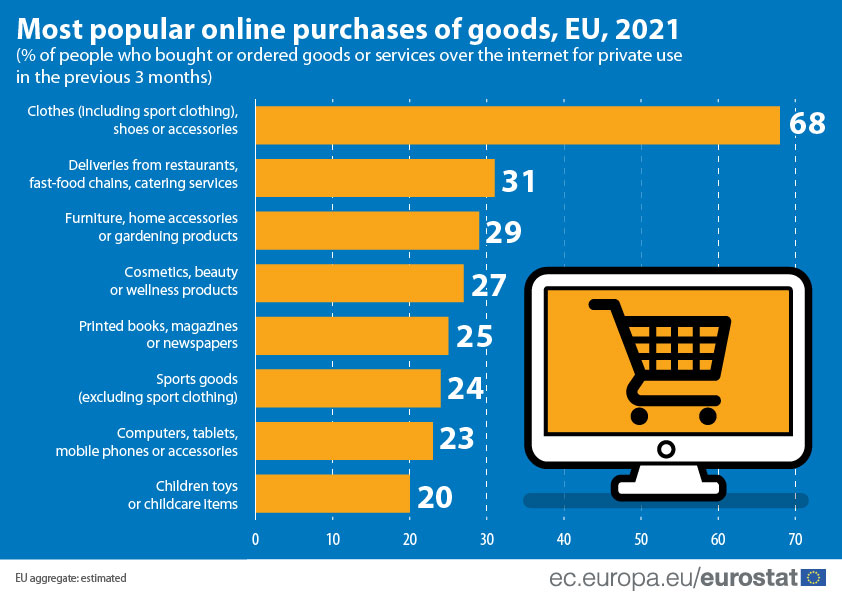Online shopping is continuing to grow in the EU. High street shopping affected by the COVID-19 restrictions and changes in habits and preferences had consequences on e-commerce.
In the 12 months prior to the 2021 survey, 90% of people aged 16 to 74 in the EU had used the internet, 74% of whom had bought or ordered goods or services for private use. Online shopping increased by 1 percentage point (pp) compared with 2020 (73% of internet users) and by 11 pp compared with 2016 (63%).
The highest shares of internet users who bought or ordered goods or services over the internet in the 12 months prior to the survey were recorded in the Netherlands (94%), Denmark (92%) and Sweden (89%). On the other hand, fewer than 50% had shopped online in Romania (44%) and Bulgaria (42%).
Source datasets: isoc_ec_ib20 and isoc_ec_ibuy
Over the last five years, the largest increases in online shopping among internet users were recorded in Czechia (+27 pp), Slovenia, Hungary and Romania (all +26 pp), as well as Croatia and Lithuania (both +25 pp).
Clothes, shoes and accessories: most common online purchase
In the 3 months prior to the survey, the most common online purchases of goods were clothes (including sport clothing), shoes or accessories (ordered by 68% of online shoppers). Wearables were followed by deliveries from restaurants, fast-food chains and catering services (31%), furniture, home accessories or gardening products (29%), cosmetics, beauty or wellness products (27%), followed by printed books, magazines or newspapers (25%), sports goods (excluding sport clothing) (24%), computers, tablets, mobile phones or their accessories (23%) and children’s toys or childcare items (20%).
Source dataset: isoc_ec_ibgs
For more information:
- Italy: 2021 data not available. As a result, the EU aggregates have been estimated. Germany, Ireland and Luxembourg: break in time series. Iceland and Switzerland: 2016 data not available.
- Data in the database are organised according to the survey year; the results above for internet use and e-shopping refer to individuals’ activities during the last 12 months prior to the survey. Data on the specific online goods purchases cover the last 3 months prior to the survey.
- The data in this article are based on the annual survey on use of ICT in households and by individuals.
- Eurostat Statistics Explained article on E-commerce statistics for individuals
- Eurostat overview on digital economy and society
- Eurostat database on digital economy and society
To contact us, please visit our User Support page.
For press queries, please contact our Media Support.


